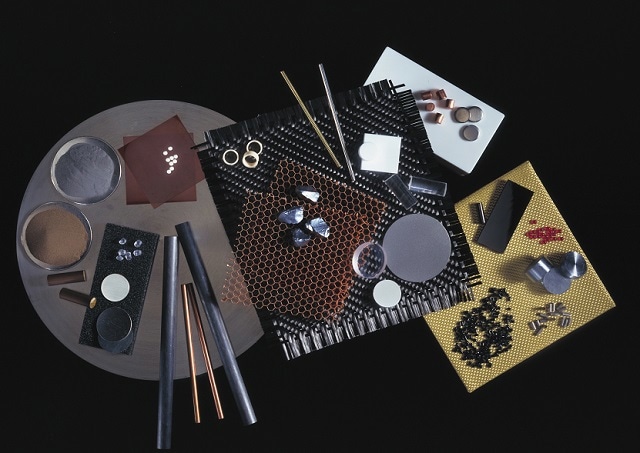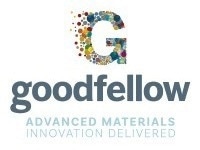
It is relatively easy to track historical price movements of raw materials such as precious metals or other high-use metals traded worldwide. From there, and using measurements of predicted demand, it is possible to estimate future trends.
We can observe that gold is traditionally a good investment because its price outperforms inflation. But what if you need to buy or consume gold for your product, or need a metal that is not commonly traded? How do you find what you need and protect yourself against price fluctuations?
Questions such as these are prompting astute scientific researchers and design engineers to take a new look at how they select and use raw materials.
Goodfellow, a well-known supplier of high-purity metals and materials to science and industry, has noticed several trends as the global scientific community addresses this issue.
Trend in online purchasing
Find it, price it, order it and pay for it – within minutes and at the best price from a supplier who may be down the street or thousands of miles away. The internet has levelled the pricing playing field for scientists and engineers looking for standard forms of many materials.
Goodfellow, which offers a service involving rapid shipment of small quantities of in-stock items from among the thousands in their online catalogue, has benefited from this trend. The company's recent distribution agreement with Sigma-Aldrich is expected to extend this benefit even further. Sigma-Aldrich, with its extensive Internet presence and operations in 40 countries, provides researchers global access to Goodfellow’s expanding portfolio of products and will enable continued growth in very important research areas.

Small quantities of materials can be rapidly shipped for applications including R&D. Image credit: Goodfellow.
As revolutionary as online purchasing has been, though, it must be backed up by an easily accessible and technically focused team of people for those occasions when a customer requires “something more”.
Goodfellow's practice of being readily available for one-on-one conversations before and after the sale – regardless of the point of purchase of their materials – remains unchanged since the company's founding more than 60 years ago.
Trend in pricing
Although the internet has made price and quality comparisons much easier, it is still important that customers be able to compare like-for-like; not finding out about delivery charges until the final stage of ordering can be frustrating. However, customer expectations may be starting to force some uniformity in this area.
Free delivery now offered by some large and very well-known websites in both the B2B and B2C markets cannot help but influence people’s thoughts regarding this aspect of delivery. Goodfellow has always quoted delivered prices, with the only additional extras being local taxes. The company has looked at this from the customer’s point of view and made it as simple and clear to order as possible.
Quoting delivered prices is also helpful when selling in the global marketplace. Although some trade barriers are falling around the world, customs formalities still exist and can cause delays and unexpected additional costs. In addition to giving customers a simple delivered price – wherever they are in the world -- Goodfellow has a worldwide network of offices and partners to facilitate orders.
Trend toward greater accessibility of information online
No longer is it sufficient for a supplier to offer only tangible products to its customers. Often it's the intangible – full technical information, comparative data tables and other scientific resources – that draws the scientists and engineers back to a particular website again and again. Online knowledge and technical resources can be an intangible "product" highly valued by discriminating purchasers of raw materials.
As useful as online information can be, however, it cannot take the place of a real-time discussion with a technical expert skilled in a particular customer’s field. As mentioned earlier, Goodfellow has always recognised the benefit of having a technical team to help customers resolve their materials issues. Although customers can do a great deal of research themselves online, the additional knowledge a supplier can provide, based on years of experience, is key to building trust. This is particularly true when discussing the intricacies of something as potentially complicated as the choice of material for a high-tech component.

Not only metals, but also ceramics and polymers, can be supplied by Goodfellow. Image credit: Goodfellow.
Trend toward choosing custom-made items
In the past few years Goodfellow has noticed a dramatic shift toward more custom enquiries and orders. People are looking for ways to limit the amount and therefore the cost of the metals they buy – for example, specifying a rod or wire with a smaller diameter or different purity. They are stepping away from a ‘close enough’ mentality and are looking to find the critical dimension or composition that will allow their product or process to work in the most economical way possible.
Nowhere is this goal more important than in the development of prototypes. The more sophisticated the product or process being developed, the more likely it is that every detail of every material and component will become part of the specifications approved by an agency overseeing the product’s safety and efficacy. While choosing a custom thickness, diameter or length during prototyping may cost a little more in the short term, economies derived from careful selection of component raw materials during development will be multiplied many times over when full-scale production begins.
If necessity is the mother of invention, fluctuating prices of raw materials will continue to foster fresh waves of ingenuity among researchers and product designers. Suppliers who provide rapid access to products, services and technical resources will ride that wave to success.
This article was prepared by Martyn Lewis in his personal capacity. The opinions expressed in this article are the author's own and do not necessarily reflect the views of AZoNetwork.
About Goodfellow

Goodfellow supplies metals, ceramics and other materials to meet the research, development and specialist production requirements of science and industry worldwide.
The Goodfellow group consists of four companies. The main administration, research laboratories and workshops are located at the Company's headquarters in Cambridge, England. The subsidiary offices in America, France and Germany provide an additional service.